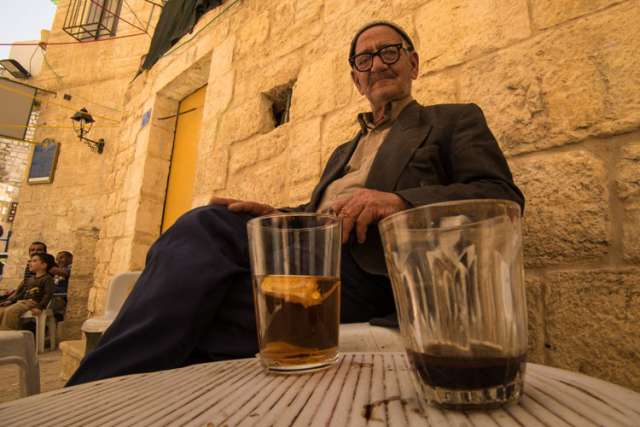People take these pictures to say, "I was here." They are staking a claim to the honourable status of world traveller.
The expensive camera at her hip is part of the outfit. It goes with the $200 walking sandals and the multi-zippered nylon back pack. But the complex, precise photojournalist's tool turns out to be difficult to use while the phone lets her lay claim to a stretch of far-away real estate right away on Facebook.
As I sit in an Arab restaurant and eat whatever they bring me (chicken, hummus, tabouli, warm bread, sweet tea) and then pay far too much for it just because I'm a foreigner, I watch the tourists float by — fat, dazed, sweating under the noon sun, determined to stay with their group and make it back to the bus.
I've listened to several tour guides' practiced patter as they gather their groups in the Church of the Nativity, the Church of the Holy Sepulchre, Shepherds' Field and the Milk Grotto. Some of what they say is true.
Most of the tourists could have reliably learned more about these places and their history from Wikipedia. Most of them would have had better insights and a better view of the holy sites watching PBS documentaries at home. As for pictures, most of them should not be allowed out of the house with a camera.
My friend Fr. Tom Rosica is fond of saying the difference between tourism and pilgrimage is that a tourist passes through places. A pilgrim allows places to pass through them.
Bethlehem tourists are mostly Christian. They are not all from more wealthy countries. Increasingly there are tour groups from the Tamil communities in India and Sri Lanka and the Philippines. Latin Americans speaking Spanish and Portuguese are everywhere. More and more of the shop owners are learning these languages.
The big groups arrive in buses from Jerusalem. They must stay together. They often wear identical caps or carry identical bags from their tour company to help the tour leader identify stragglers.
Tourists at another level up in spending and in adventurousness — families, couples and small groups — eschew the bus tour and pack a copy of The Lonely Planet in their multi-pocketed khaki trousers. But they also come through the check point for one day or less.
The independent travellers buy more expensive souvenirs — anything that can be convincingly marketed as hand made, one of a kind and authentically part of the local culture. The bus tourists hit the religious souvenir shops and buy Jerusalem crosses made in China and olive wood statuettes hand carved on ancient electric turning machines by the dozen.
In both cases there's not much sense in calling the trip a pilgrimage, at least not if we define the term as Rosica has. We all bring too much of ourselves, leaving no space for the people we meet when we get there. The journey is too easy. We're gone before our destination even begins to come into focus.
My own sense of pilgrimage is that it is, or should be, a way of extending communion, of discovering the humanity and divinity of people who live very different lives in very different places. But doing that takes time.
It is sometimes aided by spending money, because every sort of exchange becomes a point of contact. But there has to be some attempt at relationship that goes beyond money-for-goods.
If Christians in Canada want to see Christianity in the Middle East flourish they have to do more than put their currency on the table. They have to put themselves on the line. They have to get past the wall of sales pitches at the shop doors to sit and have tea and café araby with local people who may struggle to speak English, or not speak it at all. They have to ask as well as answer questions as best they can. They have to smile and nod and try to be gracious.
The more we can behave like Christians among Christians, the more we can settle down for a few days among people and wait to receive the gift of their hope, courage and generosity, the more we will realize one world-wide Church.


